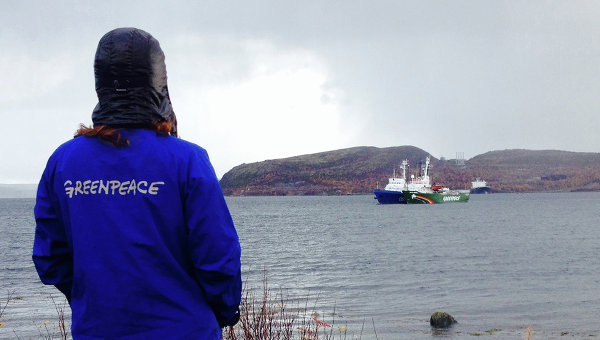MOSCOW, September 25 (RAPSI) - All members of the Arctic Sunrise ship's crew have been placed in a detention facility following interrogations with the Investigative Committee for the Murmansk Region, environmental law expert for Greenpeace Russia Mikhail Kreindlin told RIA Novosti on Wednesday.
According to Kreindlin, five persons were questioned last night. All are currently suspected of having committed acts of maritime piracy.
The Arctic Sunrise ship was seized by Russian border guards Thursday in international waters, within Russia's exclusive economic zone, a day after two Greenpeace activists scaled the Prirazlomnoye drilling rig in the Pechora Sea, the southeastern part of the Barents Sea. Greenpeace claimed that the ship was held under armed guard.
Russian investigators said the vessel was involved in maritime piracy, a crime punishable by up to 15 years in prison, and that an investigation would be conducted to consider the allegations. The ship is expected to arrive in the Russian port of Murmansk on Tuesday.
Media reports claim that some 30 people, including six Britons and one American, were on board the vessel.
Investigative Committee spokesman Vladimir Markin confirmed that investigators would question foreign nationals that were onboard the ship once they are provided with translators and lawyers.
Markin explained that three lawyers who had been hired by Greenpeace expressed their willingness to defend the detainees, but noted that this request can't be granted. According to Markin, no attorney can represent more than one of the accused in the case due to conflict of interest concerns. Markin noted that, since the investigation is in its initial stage, the possibility of such a conflict of interests can't be ruled out at this point.
The platform, owned by Gazprom Neft Shelf, a subsidiary of Russian energy giant Gazprom, is the first ice-resistant stationary oil platform in the world set to produce offshore Arctic oil.
Greenpeace and other environmental groups oppose drilling for oil in the Arctic because they say that it is currently impossible to sufficiently clean up potential oil spills in the region, and that such drilling cannot be economically viable without state subsidies.



